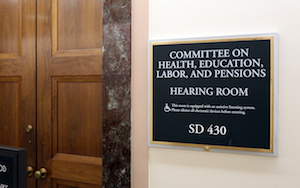 Witnesses testifying before a Senate panel called on Congress to address the retirement savings coverage gap, racial disparities and emergency savings, as well as other key retirement security issues.
Witnesses testifying before a Senate panel called on Congress to address the retirement savings coverage gap, racial disparities and emergency savings, as well as other key retirement security issues.
The May 13 hearing before the Senate Health, Education, Labor and Pensions (HELP) Committee, “Retirement Security: Building a Better Future,” featured a single panel of witnesses who offered suggestions ranging from further enhancing DC plan auto features and pooled employer plans (PEPs), to establishing sidecar emergency savings programs.
The witnesses included Lori Lucas, President and CEO of EBRI; Shai Akabas, Director of Economic Policy at the Bipartisan Policy Center; Deva Kyle, Counsel at Bredhoff & Kaiser; and Dave Gray, head of Workplace Retirement Products at Fidelity Investments.
Sen. Patty Murray (D-WA), who took over as Chair of the Senate HELP Committee at the start of the 117th Congress, called for addressing challenges faced by groups that she suggests have been historically overlooked—including minority groups, women, low-income earners and people with disabilities—in pushing for measures to update the retirement system.
“We were facing a retirement crisis before COVID-19—but as with so many other things, this pandemic has just poured gasoline on the fire,” Sen. Murray stated. “If we are going to rebuild our country stronger and fairer—we have to address the reality that for far too long, the ways we help families plan for the future have been stuck in the past.”
Sen. Richard Burr (R-NC), the ranking Republican on the Committee, urged his colleagues to build on the success of the existing DC system—calling it the “reliable superstar of the retirement world”—in acting on any forthcoming legislation and to do it in a bipartisan manner. “The question before us is what is working well and what is lagging and needs improvements. The answer to that question is easy at the surface level. The system works great,” Burr stated. “The system doesn’t work great when you don’t or can’t participate. What we need to do is help Americans and their employers offer, operate, and fund individual retirement plans.”
Recommendations
As for the testimony, there was quite a bit of overlap with many of the recommendations put forward by the witnesses, but there were also a couple of outliers.
Among the general areas of agreement were further incentivizing small businesses to offer a plan and to auto-enroll workers, similar to the changes that are in the current SECURE Act 2.0, as well as fostering emergency savings programs as a component of DC plans.
“Notably, SECURE 2.0 takes an important step to help individuals who are paying down student debt by allowing employers to make matching contributions to a 401(k) plan while their employees make student loan repayments,” Fidelity’s Gray testified. “The legislation also includes a meaningful enhancement to open MEPs and would allow 403(b) plans to participate in MEPs and pooled employer plans. We believe open MEPs and PEPs will go a long way to closing the coverage gap for millions of Americans who do not yet have access to a workplace retirement plan.”
“We know that the biggest gap when it comes to access to workplace retirement plans lies with small businesses that don’t have the wherewithal or resources to offer traditional defined contribution plans. Solutions such as PEPs may serve as appealing alternatives,” EBRI’s Lucas testified.
Lucas suggested policies to reduce plan leakage, to make immediate or deferred annuities more widely available and to support financial literacy. “When it comes to stemming leakage, a clear area of focus is cashouts upon employment termination, along with improving the existing force-out safe harbor and helping employees with emergency savings,” she stated. “Finally, as more and more private-sector workers rely solely on their defined contribution as their only workplace retirement savings plan, there is a need to sharpen their financial skills around debt, and find ways to help them spend down their retirement nest egg more confidently.”
An area that may not be so bipartisan—even though it came from the Bipartisan Policy Center’s Akabas—was a suggestion to further relax the fiduciary obligations for small businesses that participate in PEPs. “Instead of pretending that smaller employers can effectively execute these obligations—and having them bear the cost of doing so—policymakers should rethink this equation,” Akabas stated. “It would be naïve to suggest that a simple solution exists; this is a thorny issue,” he said, adding that some combination of increased fiduciary responsibility from other private-sector entities and additional regulation from the Labor Department “ought to be able to relieve smaller employers from these inappropriate duties.”
Akabas also called for a nationwide minimum-coverage standard for all employers over a certain size that preempts the various state mandates, suggesting this would be a way to expand access to workplace retirement savings that would be “less burdensome” for businesses.
Several sections of the hearing also addressed racial and other disparities in saving for retirement, and what can be done to address these issues. Deva Kyle of Bredhoff & Kaiser testified that policies that improve worker wages, require employer contributions (not just matching contributions), and provide workers with funds to cover emergencies would help to bolster retirement savings for working people.
She further suggested that proposals that are specifically targeted to reduce retirement income disparities will also help. To that end, Kyle offered support for the Women’s Retirement Protection Act, which extends spousal consent requirements to DC plans and allows more long-term part-time workers to participate in company retirement plans.
A video replay of the hearing and links to the witness testimony are online here.

